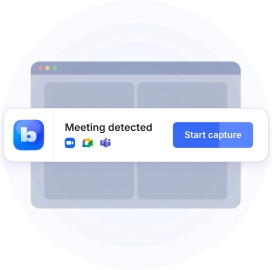
The practice of recording meetings has become increasingly common. However, you still need to make sure your potential customers feel comfortable with that.
Before pressing the record button, it's crucial to seek consent from all participants. Not only does this foster a sense of trust and transparency among attendees, but it's also the ethical course of action. Furthermore, depending on your location and the applicable laws, obtaining explicit permission may be a legal requirement.
Asking Permission Before Recording
For a smooth and respectful recording process, we recommend waiting until after you've obtained consent from everyone to hit record. This ensures transparency and aligns with privacy regulations like GDPR.
Here are example of how you can ask for permission:
- “I like to record my meetings so I can focus on our conversation instead of taking notes. Is that okay with you?”
- "Would it be alright if I recorded this session for anyone to reference later?"
- “Is it fine if I start the recording? It will help me to keep all the important information that we discussed”
- “I would like to record the meeting for learning porpuses. Is it ok for you?”
- “Before we begin, I want to confirm that it's okay for me to record our conversation. May I proceed with recording?”
Respecting Preferences
It's important to be mindful of everyone's comfort level. After requesting permission, take a moment to acknowledge any responses. If someone expresses hesitation or objects to the recording, respect their preference and proceed without recording. Remember, obtaining full consent is crucial.
If someone expresses discomfort with being recorded, you can respond by using one of the two options below.
Option 1: acknowledge and offer alternatives
- "Absolutely, I understand and respect your preference. Would you prefer if I take detailed notes and share them with everyone after the meeting?"
- "No problem at all! The recording is mainly for reference, and we can certainly proceed without it. Would you still be interested in receiving a summary of the key points discussed?"
- "Thanks for letting me know. Creating a comfortable and inclusive environment is important."
Option 2: explain flexibility and reiterate benefits
- "No problem at all! The recording is mainly for reference, and we can certainly proceed without it. Would you still be interested in receiving a summary of the key points discussed?"
Indications Of Recording A Meeting
Beyond verbally requesting permission, consider these additional steps to inform your participants that a meeting is being recorded:
- Meeting chat message: Post a clear notification in the meeting chat at the beginning, stating the session is being recorded. (add image)
- Automated tools: Explore tools like Bluedot that can automate the process of sending recording notifications within your chosen platform.
These measures create a transparent environment and provide further assurance to participants about their awareness of the recording.

Consent After The Recording Starts
To be on a save side we would recommend to clarify that meeting is being recorded second time. This way you have full protection since it’s clearly recorded that you asked for permission. You can use these examples:
- "Alright, just a reminder that the meeting is now being recorded, and you should see the notification in the chat box. Following the meeting, you'll receive an email containing a summary and the recording."
- "Excellent, the recording has begun. Could you please confirm that you're comfortable with this?"
- "Fantastic! The recording is underway, and I appreciate your confirmation. Let's proceed."
Sharing Recordings Post-Meeting
After the meeting concludes, platforms like Bluedot can automatically share the meeting recording and summary with participants. For continuous sharing of recaps, simply select "always share," and it will be done by default.

After the meeting is shared, all participants will receive an email containing a summary, action items, and a link to the video itself.

Upon opening the link, participants will find a transcript, video, and AI-generated summary with action items.








